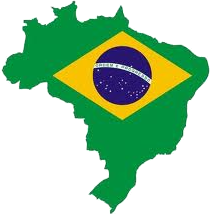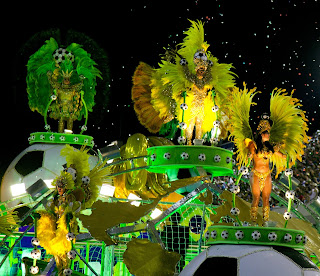 |
Your Daily English Programme #43: Sete de Setembro or Brazil's Independence Day (Reading B1-B2) |
 |
Think Before You Read |
Do You Know which country this flag belongs to? Do you know which event is shown in the photo on the right? How do you know? (let us know in the comments below)
 |  |
 |
Time to Read |
The Passage Below consists of 4 paragraphs, but they are jumbled. Skim the text and try
to put the paragraphs in their correct order1:
(mouse over the underlined words to see their meaning)
INDEPENDENCE DAY (BRAZIL)
Independence Day is considered a
Public Holiday with outings, picnics and lots of outdoor events such as parades, air
shows, fireworks and musical concerts. Parades generally occur in the morning
and fireworks in the evening. Thousands of Brazilians gather in the
streets to celebrate this day with banners, balloons and streamers. They proudly
fly their flags, sing songs and enjoy the day with their friends and families. [ ]
Brazilians did not have to fight
much for freedom; they won it rather peacefully from their parent country, Portugal. On the 7th of September, 1822, Prince Pedro, son of Portugal's king, stood near Brazil's Ipiranga River
and made an announcement of independence. He tore the Portuguese symbol from
his uniform and declared, "By my blood, by my honor, and by God: I will
make Brazil free." After that, Pedro became the Emperor of Brazil and
forced Portuguese forces to leave Brazil. In 1889, Brazil ended its monarchy
and became a republic but kept 7th September as its Independence Day. [ ]
Independence Day (Sete de
Setembro in Spanish) is the National Holiday of Brazil. It honors the birthday of the nation. On September, 7, 1822, Brazil claimed its
independence from the hands of the Portuguese. [ ]
In Brasilia (Capital
of Brazil) the day is celebrated at the Ministries Esplanade with a military
parade in the presence of the President of Brazil. On this day, many political
leaders appear at the public events and talk about the nation's heritage, laws, people, recent events and future projects. All Brazilians are entitled
to Independence Day off work except some emergency service workers2. [ ]
(see the original article to check your answers)
 |
Let's Practice |
Re-read the Passage: Which paragraphs contain information about the following?
a. who participates in the public events and what they speak about
b. the history behind Brazil's Independence Day
c. what 'Independence Day' is and why it is celebrated
d. what the people of Brazil do on this day
(compare your answers with the ones in the first comment below)
 |
Over to You |
Have you ever been to Brazil? Would you like to go? Why? (type your answers in the comments' section and receive feedback from us ;)
Here’s a short video tour of Brazil: Decide where YOU would want to go and what you would like to see in Brazil J
Well Done! This is the end of another lesson on Engramme: Your Daily English Programme. We hope it helped you learn more about world events and improve your English proficiency at the same time.
Would you like to Review the Vocabulary from this lesson? Click here.
You're a Teacher wishing to use this content in your classroom? Download a print-friendly copy HERE
1 Rearranging paragraphs in a text so that they follow in a logical order: 1. helps you better understand the main points of each of the paragraphs, 2. is a great way to notice vocabulary that is crucial to ordering text information, such as definite/indefinite articles (a/an/the), connecting words (moreover, however, etc), sentence/paragraph structure, and coherence (how a piece of text is organized to make sense as a whole).↩
2 Reproduced here (with minor changes) courtesy of calendarlabs.com↩
Answers to the info-matching questions (with paragraphs in correct order): A. p.4, B. p.2, C. p.1, D. p.3
ReplyDelete